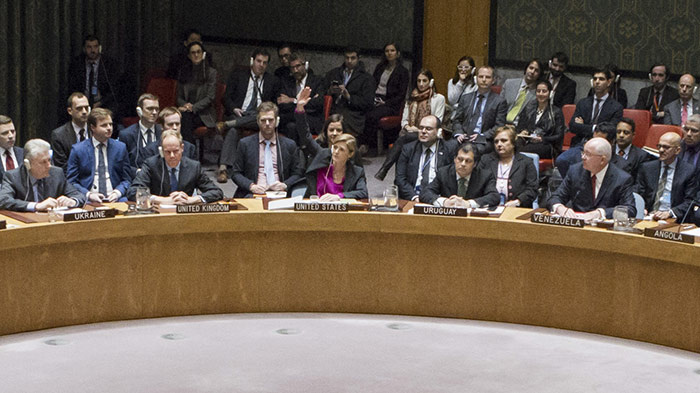Iran welcomes UNSC anti-settlement resolution but calls for more

UN Security Council passed a resolution on Sunday that censures settlement activity by Israel on Occupied Palestinian territory. The vote was able to pass the 15-member council on Friday as the United States broke with a long-standing approach of diplomatically shielding Israel and did not wield its veto power as it had on many times before - a decision that Netanyahu called “shameful”, as Reuters reported.
In an interview with Fars News Agency (FNA), University Professor Mahdi Zakerian said the United States abstinence from vetoing the resolution was mainly made in response to pressures from the international community and in line with Obama’s promises regarding a solution to the Palestinian issue, in which he failed. “The silence policy on the floor of the Security Council was his last remedy for the issue,” he added.
In a separate interview published on FNA, law scholar Massoud Zamani goes into further details saying the significance of the recent resolution lies in the possibility that it revived all previous resolutions that were on the verge of oblivion. Speaking of the United States’ refusal to veto the draft of the resolution, Zamani said it could be seen as the Obama administration’s response to eight years of pressure on its foreign policy from Netanyahu and the Zionist regime. The major flaw he found in the move was the waste of an opportunity to prevent Zionist settlements in the Occupied Palestine. “The US administration has given Israel the green on so many issues that the resolution could only be used by Obama as a political maneuver,” he added. This minor and much belated development could be constructive to revive legal disputes and the rights of Palestinians in the long run, Zamani said.
Mashregh News called the US gesture a sign of reconsideration over the US tradition of shielding Israel vis-à-vis UN resolutions. However, the outlet also called the resolution a desperate attempt by the Security Council to end illegal Zionist settlements and revive Israel-Palestine talks before Donald Trump’s presidential term kicks off.
In a note published on Shargh daily, international law expert Aredeshir Zare’ei Qanavati wrote of the incisive message this global consensus could bear for the Israeli side. “Although the resolution is binding for Israel, it does not appear to have the potential for enforcement due to the lack of a real will in the global scene,” Qanavati added. However, he argues that as a valid legal document, the resolution could be cited by the Palestinian government and human rights institutions in petitions against Israel in international courts as well as national courts in certain countries.
To hardliner Principlist daily Vatan Emrooz, the US had no choice but to shift on the Zionist regime and end its unilateral support. The article then contradicts itself saying the shift could be in the interests of the Zionist regime, arguing that for its survival Israel depends on the two-state solution and needs a mediator that the Palestinians could trust. Thus, the US vote to abstain on the resolution is intended to strengthen US position as an intermediary. “It seems that the intensity and depth of regional and international crises has left little spirit for the US to return to its previous policies and the positions adopted by Trump and his team are the last breaths of the county’s sick policies,” it added.
Iran Daily welcomed a United Nations Security Council resolution, saying it shows the global resolve to put an end to the Israel’s land grab. The government mouthpiece welcomes any move which would guarantee the realization of the Palestinians’ rightful demands, promote Palestine’s international standing and oppose the Israeli regime’s expansionist policies, Iranian Foreign Ministry Spokesman Bahram Qassemi said on Saturday. He said history, however, shows that the Israeli regime has never been committed to international pacts and legal obligations. Bahrami called for “serious and firm efforts by the international community to restore the inalienable rights of the oppressed Palestinian people and confront the expansionist and occupying policies of the Zionist regime”.

